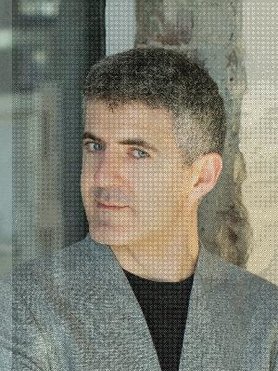

A. (Aleksandar) Staničić PhD
A. (Aleksandar) Staničić PhD
Contact
Profile
Projects
- 2018-2020 Marie Curie Individual Fellowship, project "Transurbicide" (Call: H2020-MSCA-IF-2017, Project ID: 798115)
- 2019-2021 Graham Foundation grant to individuals for the publication "War Diaries: Design After the Destruction of Art and Architecture" (University of Virginia Press, 2021), with Elisa Dainese
Biography
Aleksandar Staničić is an architect and assistant professor at TU Delft Faculty of Architecture and the Built Environment, the Chair of Methods of Analysis and Imagination, where he teaches design studios and survey courses on history and theory of architecture. Previously he was Marie Curie Postdoctoral Fellow at TU Delft (2018-2020), postdoctoral fellow at the Aga Khan Program for Islamic Architecture at MIT (2017-2018), and research scholar at the Italian Academy for Advanced Studies, Columbia University (2016-2017). Aleksandar is on the editorial board of the FOOTPRINT Architecture Theory Journal and act as an expert project evaluator for the European Commission (2020-present).
Biography
Aleksandar Staničić is an architect and assistant professor at TU Delft Faculty of Architecture and the Built Environment, the Chair of Methods of Analysis and Imagination, where he teaches design studios and survey courses on history and theory of architecture. Previously he was Marie Curie Postdoctoral Fellow at TU Delft (2018-2020), postdoctoral fellow at the Aga Khan Program for Islamic Architecture at MIT (2017-2018), and research scholar at the Italian Academy for Advanced Studies, Columbia University (2016-2017). Aleksandar is on the editorial board of the FOOTPRINT Architecture Theory Journal and act as an expert evaluator for the European Commission (2020-present). His most recent work includes edited volume War Diaries: Design After the Destruction of Art and Architecture (University of Virginia Press, 2022), numerous book chapters and research articles in The Journal of Architecture, Footprint, Architecture and Culture, and others.
Expertise
Publications
-
2024
-
2024
-
2023
Delft
Views on Delft
F. Tanis / A. Sioli / Aleksandar Staničić / K.M. Havik / H.E. Dale / W.C. Vogel / S.I. de Wit / J.A. Mejia Hernandez / E. Pérez Guembe / Dorina Pllumbi / J.A. Hawkins -
2023
Infraestructuras ocultas que apoyan los procesos migratorios en América del Sur
Aleksandar Staničić / Juanita Montoya Galvis
-
2023
-
Prizes
-
2019
War Diaries: Design After the Destruction of Art and Architecture
In recent decades, the development of high-precision weaponry systems and the instant flow of information has redefined the notion of urban warfare as a local phenomenon with global effects in an increasingly interconnected world. The annihilation of Aleppo and the broadcasted demolitions of Palmyra demonstrate the accelerating politicization of the destruction process and the rising weaponization of architecture. War Diaries looks at complex postwar settings to illuminate design responses to urban warfare and violence against art and architecture. The focus is on world regions where planners, architects and artists are involved in concrete initiatives on the ground. The question at stake, is how professionals have conducted and accomplished investigations, renewal and redevelopment of attacked sites. Examining the role of these specialists, the book illuminates the approaches and attitudes towards destruction that designers have used to remediate the effects of violence against cities and cultural heritage.
-
2018-9-1
"Transurbicide": Post-conflict reconstruction in post-socialist Belgrade
My project investigates manifold narratives of post-war urban transformation of cities in all the complexity of political, economic and cultural transition of post-socialist societies, taking for a test-bed the revealing case of Belgrade after the 1999 War between NATO and FR of Yugoslavia. Research on modalities and complex socio-political context in which transformation of post-war cities occur demand collection and processing of interdisciplinary sources and documents (secondary objective of my project), followed by the construction of histoire croisée of multiple actors (the primary objective) involved in reconstruction processes.
Work programme is specifically tailored to achieve these goals. I will join the team of researchers at TU Delft engaged in the emerging field of documenting urban conflicts and exploring post-war urban environments. There I will use TU Delft’s web platform for spatial data collection to develop new sections of the digital archive that will contain diverse material on post-war reconstruction of Belgrade. Then I will undertake extensive training at ETH’s Institute of Digital Architectural History (secondment phase) that will help me improve on the cutting-edge tools for automatized data analysis and processing of digital architectural archives. I will then apply this knowledge to analyze collected material and develop new research protocols for architectural historiography of post-conflict cities. During the return phase at TU Delft I will transfer acquired knowledge to students and peers, refine conclusions on “transition” urbicide in Belgrade and disseminate research results.
Finally, the project will offer new set of guidelines for impending urban reconstructions in active conflict zones that will shape the research of war and post-war transformation of cities in the coming years.
Ancillary activities
-
2024-09-01 - 2026-09-30
Education